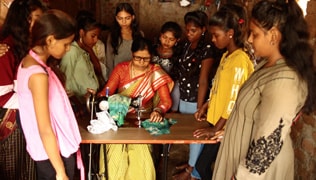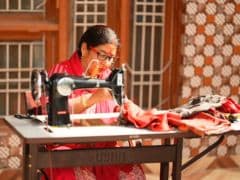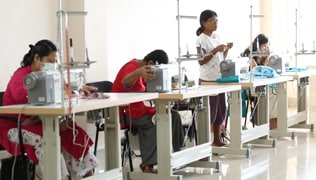- Home/
- Stories
Stories
From Despair To Dreams: How Kanta Devi Stitched A Brighter Future For Her Family
Written by Team NDTV | Tuesday December 09, 2025In Takkar Birpur village, Jammu and Kashmir, Kanta Devi escaped domestic violence and poverty through the Usha Silai School's tailoring training. Earning ₹10,00020,000 monthly, she now teaches women in border areas while inspiring her daughter Tanya to dream of a bourtique
- Written by Team NDTV | Thursday December 11, 2025
The USHA Silai School Program empowers women across India by teaching sewing skills, enabling them to earn an income, achieve financial independence, and build better futures for themselves and their families.
- Team NDTV | Saturday March 22, 2025
The USHA Silai School Program empowers women across India with sewing skills, transforming them into trainers and fostering community growth and independence
- Team NDTV | Thursday March 13, 2025
Celebrating women entrepreneurs and their handmade crafts, empowering communities through creativity at the 5th Meghalaya Aajivika Saras Mela
- Team NDTV | Tuesday February 03, 2026
USHA Silai School in Ramanathapuram empowers local women through tailoring education, enabling them to build businesses and achieve financial independence
- Team NDTV | Monday March 10, 2025
Mamata Devi's inspiring journey from hardship to empowerment through sewing training, uplifting her community and transforming lives
- Team NDTV | Thursday March 06, 2025
Women in rural India, like Geetaben and Leelaben, are transforming lives through Silai Schools and Training Cum Production Centres, fostering empowerment, skill development, and community resilience
- Team NDTV | Wednesday March 05, 2025
Anwara Begum's journey with USHA Silai School in Odisha showcases her transformation into a successful entrepreneur, empowering her community and inspiring young girls toward financial independence
- Team NDTV | Wednesday March 05, 2025
Prabha turned her life around through the USHA Silai School, empowering herself and other women with sewing skills and financial independence
- Team NDTV | Tuesday February 25, 2025
The USHA Silai School empowers women in Ariyalur, like Menaka, fostering financial independence and reshaping family dynamics through essential vocational training
Adopt a Silai School
About the Initiative

Kushalta Ke Kadam, an initiative by USHA Silai School and NDTV has entered its eighth season. The aim is to empower more women across rural India by teaching them sewing skills and helping them open new doors of opportunities for themselves. The initiative encourages rural women to become financially independent and entrepreneurs by taking up sewing and training others in their respective communities.
Since 2011, the USHA Silai School initiative has trained more than 12 lakh rural women through over 33,000 Silai schools, spanning over 20,751 villages across India.
The women earn Rs. 4,000 – 5,000 per month on an average, with the highest recorded monthly earning being Rs. 84,000 in a month. This earning works as a catalyst towards building their self-confidence, reducing gender inequities, and raising their stature within their families and in society at large.
In Pics

Rebari girls grow up learning traditional embroidery, which along with their new found sewing skills developed at Usha Silai Schools, is helping them earn a living.

Usha Silai School has empowered many rural women to support their family and send their children to school.

The Usha Silai School, established in a small nondescript village that goes by the name of Kottai, is helping empower people from varied communities.

The all-inclusive Usha Silai School Programme covers the entire nation from hamlets tucked between hills to villages cast by the sea.

Vegetables farmers from the Mizoram hills earn very little given the topography of the area. Usha Silai Schools have played an important part in this region by skilling women to financially contribute towards their households.

Usha Silai School learner Lucy has trained seven other women in her community, helping them to become financially independent.

Women like Kaviben from the nomadic Rebari community are finally laying down their roots as they begin to gain financial independence and thereby stability through Usha Silai School.

Usha Silai School, located in the Gujarat's Bhuj village, is enabling rural women to earn as much as Rs. 2,500-4,000 each month.

Usha Silai School, in association with a Gujarat based NGO called Kala Raksha, is trying to bring about a Silai revolution in Bhuj.

Besides training other women from their community, many Usha Silai School learners have become entrepreneurs in their own right.

With sewing becoming easily accessible and lucrative, the silai schools are also helping revive traditional motifs and designs.












